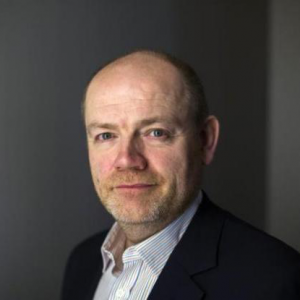An Interview with Mark Thompson

Mark Thompson, President & CEO, The New York Times
Published October 8, 2019
If you hadn’t ended up with a career in media, where would we find you?
The other big thing that has always fascinated me is writing, indeed I wrote a book a few years ago. Maybe that could have been an alternative path, but I only started to pursue that recently. I got a graduate traineeship at the BBC; I had applied because all my friends where applying. I didn’t really have a plan, I just got the job and have bumbled along in media ever since.
What advice would you give yourself if you were graduating from college right now?
The boring advice is: make sure your statistics and analytical faculties are up to snuff. Right now I’m doing a remedial graduate level statistics course to try and catch up, that’s the boring advice. But I think the big thing – and I say this to my own children – is you probably have as good an idea at the age of 21, 22, as your bosses do, and they are probably more scared than you. So be yourself, be confident and get on with it.
What do you miss most about living in the UK?
I miss a pint of Old Hooky preferably in the Rose and Crown in North Oxford. It’s a natural product of beer, which is fresh and can’t easily be exported – it has to be made and drunk quite quickly. Americans famously think it’s disgustingly warm, but it’s not – it’s not refrigerated, but it is cold. It tastes delicious and you can’t really get it anywhere in the States – I miss that. Most of the other things, in terms of food, are portable. The Myers of Keswick down in the village will sell you McVities biscuits and marmalade. Those things can be easily moved across the Atlantic, a great big barrel of beer can’t. Also, to state the obvious, the “pubs” here aren’t really pubs at all, but sports bars with TVs and the rest of it. Which is all very well if you like that sort of thing.
What is the technological advancement that has taken place in your lifetime that you believe has had the biggest effect on who you are as a person?
It’s a slight cheat, but I would say mass jet travel. The first scheduled flight – on a Comet, a British airliner – was in 1952 and even in 1957, when I was born, it was still quite rare. By the time I was in my late teens and early 20s, it was just part of life. By the time I came out to live in New York and work for the BBC in the Rockefeller Centre (I was 24), I was taking jet flights most weeks as we flew everywhere to cover America. While I was there, I started dating one of my colleagues, Jane and, after I returned to the UK eight months later, Freddie Laker and Peoples Express played a big part in helping us to continue to see each other. We ended up getting married. Many people use jets for business travel or leisure. But it really changed my life. If I hadn’t got to know America, by flying all over it, there’s no way I would have become the CEO of the New York Times. Now, of course, we worry about the colossal carbon footprint that jet travel leaves on the planet, and I hope I can limit my own travel more in the future – but my life would have turned out very differently if that first Comet had never taken to the air.
Where are you itching to travel?
That’s a hard one. I have been to lots and lots of places. At one stage in my life, I spent about 10-12 years as a journalist making TV news and documentaries in the field. I still feel the pull to go to the big stories wherever they are happening and, in some ways, the stranger and scarier the place the better. I used to love the adventure, camping for a purpose when you are actually working and the only way of getting there is camping. I definitely don’t like camping as a leisure pursuit, but the business of going on an expedition with something deadly serious in mind in a war zone or whatever I always found completely compelling. My travel now is like most peoples’, it’s for business or for holidays, but I would love to do more exploring. When I think about travel, I think more about the world’s great walks and treks. I climbed Mount Kilimanjaro a few years ago with one of my kids. I’ve done the Coast-to-Coast walk in the UK one and a half times and I would do it as many times as I could before I drop dead, it’s a fantastic walk. I quite fancy doing the old primage walk from Canterbury to Rome, that appeals to me – though my favorite part of every journey is the setting out rather than the arriving.
What book have you read recently that you’d recommend and why?
I have a rather specific recommendation: a book called ‘The Book of Why’ by Judea Pearl. It is quite dense and chewy, but is really interesting. Pearl won the Turing prize and he is a great mind from the world of artificial intelligence. It’s a book about the advances which have been made – many by him – in advancing traditional statistics into a science of causal inference. So, it’s about a more powerful and relevant way of using data than 99% of the way people use it currently, including most current machine learning. I hope we apply some of Pearl’s thinking to some of our digital challenges at The New York Times.
